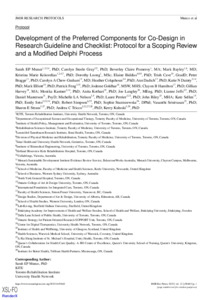MUNCE, Sarah EP, STEELE GRAY, Carolyn, POMEROY, Beverley Claire, BAYLEY, Mark, KOKORELIAS, Kristina Marie, LUONG, Dorothy, BIDDISS, Elaine, CAVE, Trish, BRAGGE, Peter, CHEW-GRAHAM, Carolyn A, COLQUHOUN, Heather, DADICH, Ann, DAINTY, Katie N, ELLIOTT, Mark, FENG, Patrick, GOLDHAR, Jodeme, HAMILTON, Clayon B, HARVEY, Gillian, KASTNER, Monika, KOTHARI, Anita, LANGLEY, Joe, JEFFS, Lianne, MASTERSON, Daniel, NELSON, Michelle LA, PERRIER, Laure, RILEY, John, SELLEN, Kate, SETO, Emily, SIMPSON, Robert, STANISZEWSKA, Sophie, SRINIVASAN, Vasanthi, STRAUS, Sharon E, TRICCO, Andrea C and KULUSKI, Kerry
(2023).
Development of the Preferred Components for Co-Design in Research Guideline and Checklist: Protocol for a Scoping Review and a Modified Delphi Process.
JMIR Research Protocols, 12: e50463.
[Article]
Documents
32631:626131
![[thumbnail of Langley-DevelopmentOfThePreferredComponents(VoR).pdf]](https://shura.shu.ac.uk/32631/1.hassmallThumbnailVersion/Langley-DevelopmentOfThePreferredComponents%28VoR%29.pdf)

Preview
Abstract
Background:
There is increasing evidence that co-design can lead to more engaging, acceptable, relevant, feasible, and even effective interventions. However, no guidance is provided on the specific designs and associated methods or methodologies involved in the process. We propose the development of the Preferred Components for Co-design in Research (PRECISE) guideline to enhance the consistency, transparency, and quality of reporting co-design studies used to develop complex health interventions.
Objective:
The aim is to develop the first iteration of the PRECISE guideline. The purpose of the PRECISE guideline is to improve the consistency, transparency, and quality of reporting on studies that use co-design to develop complex health interventions.
Methods:
The aim will be achieved by addressing the following objectives: to review and synthesize the literature on the models, theories, and frameworks used in the co-design of complex health interventions to identify their common elements (components, values or principles, associated methods and methodologies, and outcomes); and by using the results of the scoping review, prioritize the co-design components, values or principles, associated methods and methodologies, and outcomes to be included in the PRECISE guideline.
Results:
The project has been funded by the Canadian Institutes of Health Research.
Conclusions:
The collective results of this project will lead to a ready-to-implement PRECISE guideline that outlines a minimum set of items to include when reporting the co-design of complex health interventions. The PRECISE guideline will improve the consistency, transparency, and quality of reports of studies. Additionally, it will include guidance on how to enact or enable the values or principles of co-design for meaningful and collaborative solutions (interventions). PRECISE might also be used by peer reviewers and editors to improve the review of manuscripts involving co-design. Ultimately, the PRECISE guideline will facilitate more efficient use of new results about complex health intervention development and bring better returns on research investments.
Actions (login required)
 |
View Item |



 Tools
Tools Tools
Tools